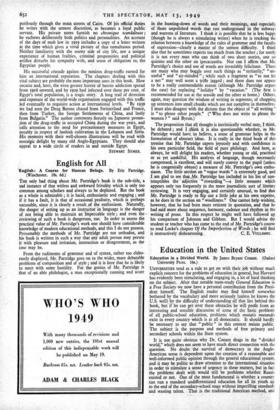English for All
English: A Course for Human Beings. By Eric Partridge. (Winchester. 18s. 6d.)
THE only bad thing about Mr. Partridge's book is the sub-title, a sad instance of that witless and awkward frivolity which is only too common among scholars and always to be deplored. But the book as a whole is admirable • it is lucid, enthusiastic and engaging ; and if it has a fault, it is that of occasional 'prolixity, which is perhaps excusable, since it is clearly a result of the enthusiasm. Naturally, the danger of setting up as an instructor in language is the danger of not being able to maintain an impeccable style ; and even the. reviewing of such a book is dangerous, too. In order to assess the practical value of Mr. Partridge's work one should have considerable knowledge of modern educational methods, and this I do not possess. Presumably the methods of Mr. Partridge are not orthodox, and his book is written in such a way that any adult person may peruse it with pleasure and irritation, instruction or disagreement, as the
Case may be. - From the rudiments of grammar and of syntax, rather too elabo- rately displayed, Mr. Partridge goes on to the wider, more debatable problems of composition and of style and it is here that he is likely to meet with some hostility. For the genius of Mr. Partridge is that of an able philologist, a man exceptionally cunning and acute
in the hunting-down of words and their meanings, and especially of those unpolished words that run underground in the subways and warrens of literature. I think it is possible that he is less happy (though he is always a stimulating writer) when he is tracking the relation between a knowledge of the rules of grammar and the faculty of expression—clearly a matter of the utmost difficulty. I think also that he sometimes expects too much from the teacher ; for surely it is not every man who can think of two short stories, one on quinine and the other on ipecacuanha. Nor can I affirm that Mr. Partridge's choice and use of words are invariably felicitous. There are many who may boggle over such things as " tertiarily," " un- useful " and " air-minded " ; while such a fragment as "to not hit a net" may well seem a trifle jagged • and there does not appear to be a really commendable reason (although Mr. Partridge argues the case) for replacing " holiday " by "vacation." (The first is recommended for use at the seaside and the other at home.) Others, again, may question the wisdom of writing in segments, of chopping up sentences into small chunks which are not complete in themselves. I must also disagree with the dictum that the object of "all writing" is "to please other people." (" Who does not write to please the women ? " said Byron.) The proposition that all thought is intrinsically verbal may, I think, be debated ; and I think it is also questionable whether, as Mr. Partridge would have us believe, a sense of grammar helps in the formulation of abstract ideas. It is really in the third book of this treatise that Mr. Partridge capers joyously and with confidence in his own particular field, the field of pure philology. And here, as always, he will delight his readers, whether young or old, practised or as yet unskilful. His analysis of language, though necessarily compressed, is excellent, and will surely convey to the pupil (unless he is congenitally obtuse) a measure of Mr. Partridge's own enthu- siasm. The little section on "vogue words" is extremely good, and I am glad to see that Mr. Partridge has included in his list of con- temptibles the adjective "rewarding "—a little monster which appears only too frequently in the more journalistic sort of literary reviewing. It is very engaging, and certainly unusual, to find that Mr. Partridge is ready to flip out a little joke at his own expense, as he does in the section on "woolliness." One cannot help wishing, however, that he had been more reticent in quotation, and that he had said more about sequence, harmony, cadence and rhythm in the writing of prose. In this respect he might well have followed up his comparison of Johnson and Gibbon. But I would advise the student or teacher who has come to the end of Mr. Partridge's course to read Locke's chapter Of the Imperfection of Words; - he will find






































 Previous page
Previous page